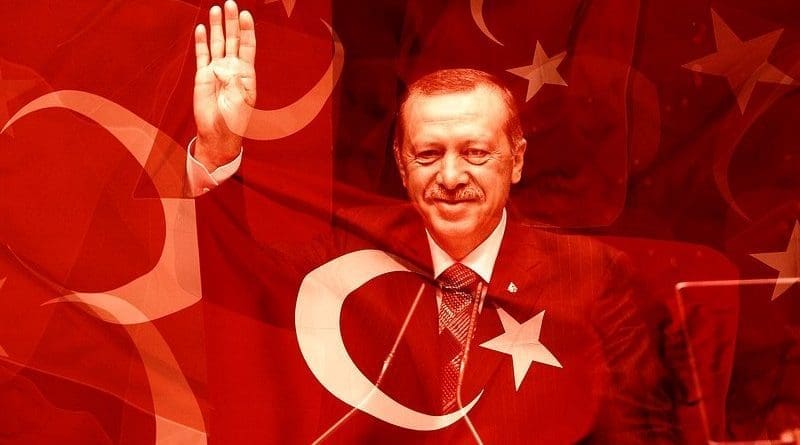Erdogan Isolated In The Carnage Of Idlib – OpEd
By Arab News
By Cornelia Meyer*
As always in the Middle East, the geopolitics of Syria are complicated, and in the northwestern Idlib province they are tragic too. Again as always, it is innocent civilians who pay the price; having struggled for nine years to keep one step ahead of the Assad regime’s barrel bombs, they now flee Russian air strikes.
Mostly they are fleeing toward the border with Turkey, which is where President Recep Tayyip Erdogan comes in. Having profoundly irritated his NATO allies and hitched his wagon to Vladimir Putin in the Kremlin, Erdogan now finds himself without friends at a time when he needs them most.
The Turkish president took a calculated risk when he decided to buy the Russian S-400 air defense system, a decision that backfired when the US threw Turkey out of the F-35 fighter jet program. The collateral damage was greater than that, because many NATO allies had already had enough of what they consider to be Erdogan’s erratic behavior.
Meanwhile the Turkish president deepened his reliance on Moscow by signing the Sochi agreement with Russia and Iran in 2018, establishing a de-escalation zone in Idlib to avert a full-scale Assad regime offensive and an inevitable bloodbath. To enforce the zone, Turkey set up 12 military “observation posts” in Idlib.
Alas for Erdogan, he was alone in taking the de-escalation zone seriously. Assad and Putin both appear determined to clear the last vestige of Syrian opposition from Idlib, no matter how many innocent people die in the process. Their forces, on the ground and in the air, are powering north, either ignoring Turkey’s observation posts, or simply destroying them; the Turkish death toll in Idlib is now 55.
Erdogan has responded with a series of threats. First he said Turkey would launch an offensive in Idlib unless Assad regime troops withdrew by Feb. 29. Then he softened that, and said he would launch an offensive unless Assad regime troops withdrew from around Turkey’s observation posts by Feb. 29.
Of course, no sane person wants a conflict between a NATO member and Russia, so the diplomatic lines between Ankara, Moscow and Brussels have been red hot, while Erdogan and Putin spoke by phone on Friday. Berlin said Chancellor Angela Merkel, French President Emmanuel Macron and Erdogan would be ready to meet Putin, and they await a response.
Meanwhile Erdogan has chosen to play the refugee card, threatening to tear up the agreement he signed with the EU in 2016. Under that deal, every refugee who arrived in the Greek islands from Turkey would be returned to Turkey, and EU member states would take one Syrian refugee from Turkey for every Syrian returned from the islands. Turkey was also promised 6 million euros in aid, and visa-free access for Turks to the Schengen area.
This weekend Erdogan threatened to end the refugee deal, because “the Europeans need to keep their promises.” Tens of thousands of migrants massed on the Turkish borders with Europe, and thousands stuck on the Turkish-Greek border at Pazarkule were in skirmishes with Greek police.
It is difficult to see how the situation can be de-escalated, but in the long run it will have to be. Yes, Turkey is already host to nearly 4 million Syrian refugees and cannot accommodate any more, but in Idlib there are close to a million people on the run with nowhere to go.
At the same time, what happens in Idlib will do nothing to help the reconstruction of Syria, a country reduced to rubble. The international community sees what has been happening in Syria, and particularly in Idlib, as a violation of international law and human rights. The result will almost certainly be prolonged and crippling sanctions — which will be bad for the Assad regime, but much worse for the civilian population.
In light of the immense suffering of the civilian population in Syria since 2011, we have to ask ourselves why the international community failed to act decisively. Power politics and geopolitics are one thing, but humanitarian concerns should account for much more. They should form the common ground for the family of nations. Alas, conflict after conflict proves that they take second place. Will we never learn?
- Cornelia Meyer is a business consultant, macro-economist and energy expert. Twitter: @MeyerResources


The writer fails to address the issue of Turkey interfering in the affairs of a sovereign nation, illegally entering said country for military operations against the head of said sovereign nation and backing and helping terrorists in their illegal armed uprising and attempting to overthrow the legitimate government.
Turkey should just get out.
So true.Syria has the right to free its territory from the terrorists US created after Iraq war.Trump boasts about winning over ISIS but supports Erdogan to continue the killing of innocent people by supporting Turkey to protect the terrorists.